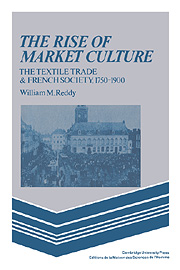Book contents
- Frontmatter
- Contents
- List of figures and maps
- List of abbreviations
- Preface
- Introduction
- Part One A world without entrepreneurs, 1750–1815
- Part Two Uses of the market idea, 1816–1851
- Part Three Unquestioned assumptions, 1852–1904
- 8 The clock time of the Second Empire
- 9 The moral sense of farce
- 10 Little insurrections
- Conclusion
- Notes
- Bibliographical note
- Index
9 - The moral sense of farce
from Part Three - Unquestioned assumptions, 1852–1904
Published online by Cambridge University Press: 30 September 2009
- Frontmatter
- Contents
- List of figures and maps
- List of abbreviations
- Preface
- Introduction
- Part One A world without entrepreneurs, 1750–1815
- Part Two Uses of the market idea, 1816–1851
- Part Three Unquestioned assumptions, 1852–1904
- 8 The clock time of the Second Empire
- 9 The moral sense of farce
- 10 Little insurrections
- Conclusion
- Notes
- Bibliographical note
- Index
Summary
A life lived in ugly surroundings is also ugly. The social investigators of nineteenth-century France found nothing in their research that contradicted this proposition and plenty that appeared to confirm it. They were even able to come up with corroborating evidence from the laborers' own mouths. Audiganne discovered a local dialect poem that proved Lille inhabitants preferred the cellars of the rue des Etaques to lighter, drier dwellings. Reybaud, too, claimed to have heard this repeatedly from the laborers themselves while in Lille. Villermé had seen with his own eyes the relish that they took in their gin- and tobacco-ridden dens.
Audiganne could have used other dialect songs to help prove the inherent grossness and meanness of Lille's laboring poor. There is an undated song from mid-century called “Le Branle-Bas” (“The Big Commotion”), for example, which can be used to show the immoral atmosphere surrounding family life. It is undoubtedly a genuine piece written by an illiterate or semiliterate factory laborer. It tells the tale of a widower with two older children who is looking for a wife “just to warm his feet” at night. He marries a woman who owns an abundance of furniture. He is thrilled by the extent of his windfall. But his children treat the woman badly. As soon as the father leaves the house, the children begin “to make trouble, making all kinds of demands; the woman was so frightened she froze to the spot. The boy and girl, as furious as wolves, spitting in her face said ‘You should have come with a cord around your neck.’ ” Soon the woman leaves, taking her furniture with her.
- Type
- Chapter
- Information
- The Rise of Market CultureThe Textile Trade and French Society, 1750–1900, pp. 253 - 288Publisher: Cambridge University PressPrint publication year: 1984



